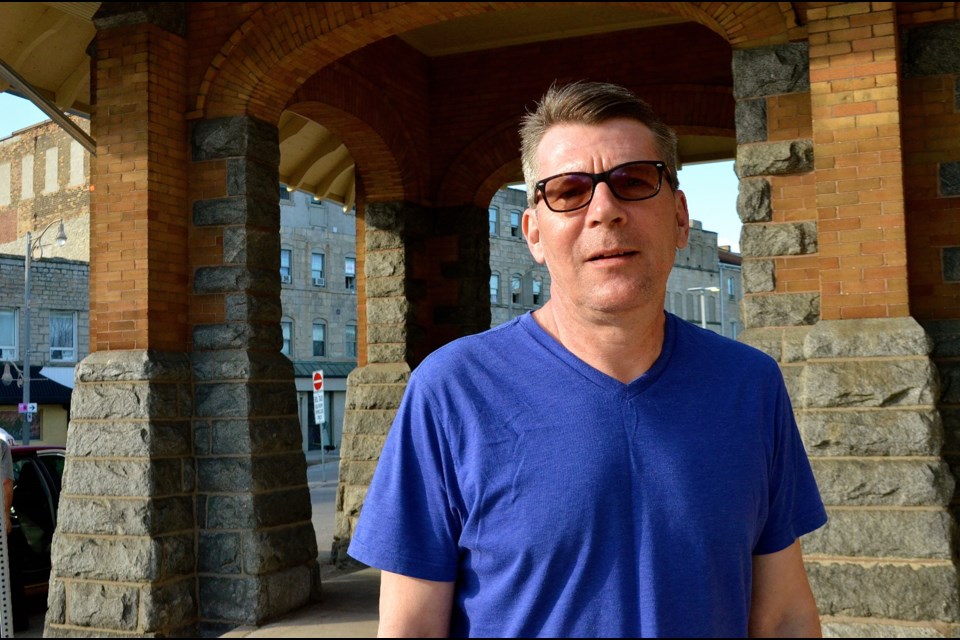Drug abuse nearly killed Donny Hay several times during the 35 years he lived as a drug addict and he hopes by sharing his story he can help other addicts and their loved ones avoid the mistakes he made.
“I’ve lost count of how many times my addiction nearly killed me,” said Hay. “There is a better way. I’ve lived it.”
When we first met Hay back in September of 2018 he had launched a petition to bring a drug detox centre to Guelph. Since then he has collected more than 1,600 signatures and with support from the Streetwise Community Initiative he is facilitating an addiction support group every Thursday at the Drop In Centre on Gordon Street.
“It starts May 9 at 11:30 a.m.,” said Hay. “I want people to come and be able to talk. It’s not for me. I just facilitate. I tell my story at the beginning because they need to know where I am coming from.”
Hay’s story of childhood sexual trauma at the age of nine followed by three and a half decades of drug addiction and related criminal behaviour is a cautionary tale about the dangers of drug abuse.
“I want addicts to come and tell people how they are feeling in a safe environment where they won’t be looked at as junkies,” said Hay. “Anyone whose life has been adversely affected by drug addiction is welcome – family members, loved ones, anyone.”
Hay said the article published in GuelphToday last September helped him raise awareness for his petition campaign and gave him the courage to talk about his experiences during a Stop the Stigma rally presented by the Wellington Guelph Drug Strategy and Partners at Guelph City Hall.
“When the story first came out I felt like an open wound,” he said. “But you know what? It has been so freeing. Everybody knows where I come from and what I have been through. I am not ashamed of it and I am doing my best to help other people because that is what recovering drug addicts have to do. Sometimes you have to open the soul.”
It is estimated that 11 people die each day from opiate overdoses in Canada and a recent spike in overdoses and overdose deaths in Guelph, related mostly to fentanyl, has led to warnings from the Guelph Police Service and Wellington-Dufferin-Guelph Public Health.
Hay welcomes recent efforts by the Mayor’s Task Force on Homelessness and Community Safety and the return of the Addiction Court Support Program.
“It provides some addicts with a court appointed drug counsellor and Stonehenge Therapeutic Community supports it,” said Hay. “It’s a good idea but not all drug addicts are criminals. I hope it works. I hope the mayor spent his money well.”
Hay acknowledges that simply having a permanent public drug detox centre in Guelph won’t guarantee addicts will use it.
“In my life I have gone to detox at least 30 times - I kid you not,” he said. “I got on the Greyhound downtown a couple times headed for a detox centre in Kitchener and got off at Wellington and Fife. If I managed to get into a detox I’d escape. As soon as the withdrawals hit I was gone out the window. I ran out of one of these places in my underwear.”
He hopes that the addiction support group will provide the kind of support addicts need to get clean.
“This is a long-term problem and we need a long-term solution,” he said. “When I started this I expected to be pounding the pavement for three years. This is not going to go away tomorrow.”
Hay has been clean for 10 years but he is still paying for the terrible things he did to people he loved when he was an addict.
“Two of my daughters don’t talk to me and it breaks my heart,” he said. “I think about it every day. I have grandchildren I have never met but I have to be okay with that because if I am not that just gives me an excuse, so to speak.”
He does have support from his daughter Miranda who helps him maintain the Medical Detox Centre for Guelph Facebook page and his wife Amy has stuck by him through 8 years of addiction and 10 years of sobriety.
In a bitter case of irony she began self-medicating six years ago to deal with pain related to diabetes and other health problems.
“She was using fentanyl patches,” said Hay. “As a result she had a massive heart attack in 2014 and it shredded her valves.”
Because for her terminal condition doctors referred her to hospice care but Donny is taking care of her at home
“She is the love of my life,” he said with tears in his eyes. “I don’t know what else to say. One day I am going to be without her but she made me promise that I won’t stop. She made that crystal clear to me.”



